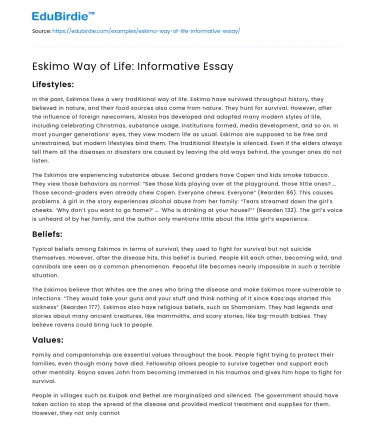Lifestyles:
In the past, Eskimos lives a very traditional way of life. Eskimo have survived throughout history, they believed in nature, and their food sources also come from nature. They hunt for survival. However, after the influence of foreign newcomers, Alaska has developed and adopted many modern styles of life, including celebrating Christmas, substance usage, institutions formed, media development, and so on. In most younger generations’ eyes, they view modern life as usual. Eskimos are supposed to be free and unrestrained, but modern lifestyles bind them. The traditional lifestyle is silenced. Even if the elders always tell them all the diseases or disasters are caused by leaving the old ways behind, the younger ones do not listen.
The Eskimos are experiencing substance abuse. Second graders have Copen and kids smoke tobacco. They view those behaviors as normal: “See those kids playing over at the playground, those little ones? … Those second-graders even already chew Copen. Everyone chews. Everyone” (Rearden 86). This causes problems. A girl in the story experiences alcohol abuse from her family: “Tears streamed down the girl’s cheeks. ‘Why don’t you want to go home?’ … ‘Who is drinking at your house?’” (Rearden 132). The girl’s voice is unheard of by her family, and the author only mentions little about the little girl’s experience.
Save your time!
We can take care of your essay
- Proper editing and formatting
- Free revision, title page, and bibliography
- Flexible prices and money-back guarantee
Beliefs:
Typical beliefs among Eskimos in terms of survival, they used to fight for survival but not suicide themselves. However, after the disease hits, this belief is buried. People kill each other, becoming wild, and cannibals are seen as a common phenomenon. Peaceful life becomes nearly impossible in such a terrible situation.
The Eskimos believe that Whites are the ones who bring the disease and make Eskimos more vulnerable to infections. “They would take your guns and your stuff and think nothing of it since Kass’aqs started this sickness” (Rearden 177). Eskimos also have religious beliefs, such as Shamanism. They had legends and stories about many ancient creatures, like mammoths, and scary stories, like big-mouth babies. They believe ravens could bring luck to people.
Values:
Family and companionship are essential values throughout the book. People fight trying to protect their families, even though many have died. Fellowship allows people to survive together and support each other mentally. Rayna saves John from becoming immersed in his traumas and gives him hope to fight for survival.
People in villages such as Kuipak and Bethel are marginalized and silenced. The government should have taken action to stop the spread of the disease and provided medical treatment and supplies for them. However, they not only cannot get in contact with the outside world but also they are put in quarantine created by the government.






 Stuck on your essay?
Stuck on your essay?

